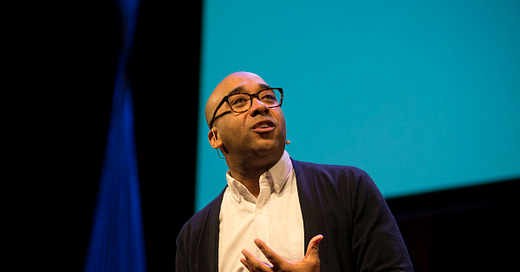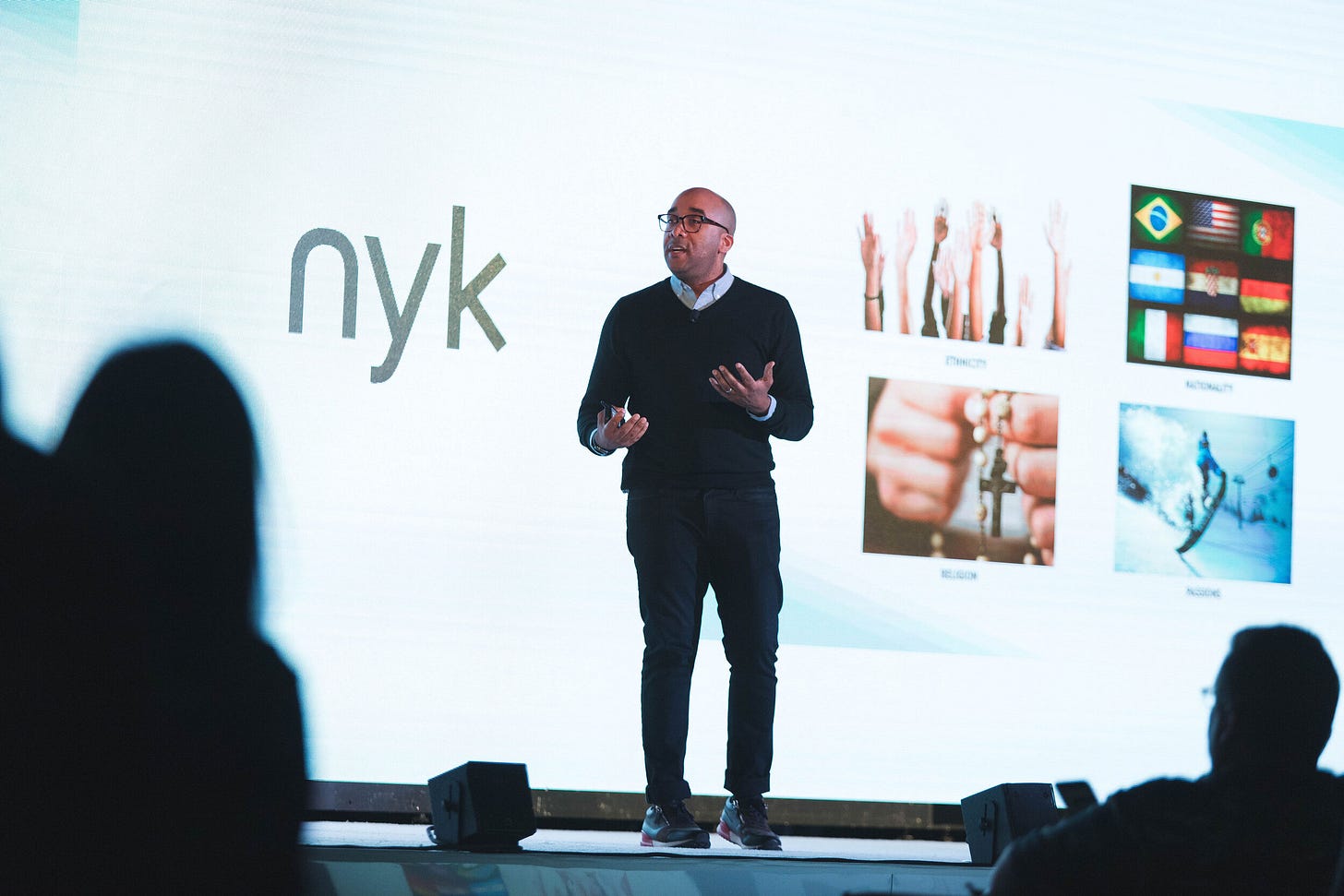Can Brands Create Culture? Dr. Marcus Collins Explains
Our wide-ranging interview with culture marketing legend Dr. Marcus Collins
Since its inception, Bolster has prided itself on being an agency that helps brands connect into culture. So when the opportunity presented itself to speak with Dr Marcus Collins – who literally wrote the book on cultural marketing – we jumped at it.
Dr Collins is one of the speakers at the World Business Forum in Sydney on November 13-14, alongside the likes of former New Zealand Prime Minister Jacinda Ardern, AI expert and visionary leader Radhika Dirks, and tennis legend Andre Agassi. In this conversation with Bolster Group’s Head of Strategy & Growth Darren Levin, Dr Collins talks about the imperative for brands to participate in culture and other lessons from his new book For The Culture: The Power Behind What We Buy, What We Do, and Who We Want to Be.
For tickets and more information about the World Business Forum click here.
“Whassup” seems like an obvious place to start any conversation, but especially one with culture marketing legend Dr Marcus Collins. It’s one of the earliest examples in his book For The Culture of a brand – in this case the iconic American beer Budweiser – to not only be attuned to cultural conversations, but to leverage them as a shortcut back to relevance.
In its legendary 60-second spot, Budweiser engaged director Charles Stone III to recreate his short film True, which depicted a group of friends – his friends – greeting each other with variations of “Whassup”.
Aired during Super Bowl XXXIV in 2000, the campaign is a textbook example of a brand being able to zero in on a cultural conversation as its happening, and then reflect it back at the audience.
“For brands to leverage and harness the power and influence of culture, they have to understand it,” says Collins from his home in Michigan. “You have to understand the system of conventions, expectations that demarcate who these people are and govern what they do. We have to be able to interpret the world through their lenses, but interpreting isn't enough. To engage in it. Engaging is an active sport, not passive.”
From Beyoncé to Brooklyn
As the former Chief Strategy Officer at Wieden+Kennedy New York and a marketing Professor at the Ross School of Business at University of Michigan, Dr Collins is that rare mix of practitioner and scholar; someone who doesn’t just talk the talk, but walks the walk.
Engaging actively in culture is something he’s built his career on – from fostering fan communities as Beyoncé’s digital strategist to helping the Brooklyn Nets launch with a stealth campaign called #HelloBrooklyn that tapped into local rivalries and borough pride. He’s worked with Apple, McDonald’s, and even Budweiser during a stint at the New York-based agency and brand consultancy Translation.
It was less than a decade on from “Whassup” and the brand had reached out to Translation to “help correct its course”. The agency, of course, was helmed by former record executive Steve Stoute with some pretty big name silent partners: Jimmy ‘Beats By Dre’ Iovine and none other than Jay-Z himself.
The problem, Dr Collins says in the book, was that Budweiser represented “yesterday’s Americana”. This new Americana, he said, didn’t wave flags. They wore them ironically on t-shirts, but they did believe in the American dream: the thought you could make something of yourself, no matter where you come from.
This was the thinking that led to Budweiser’s Made In America Festival, a two-day event that brought together all strands of this new Americana music – from Jay-Z to Pearl Jam, Skrillex to Run-DMC. It ran for seven straight years, received a shoutout from Obama, poured millions into Philadelphia’s local economy, and was the subject of a 2013 Ron Howard documentary. Oh, and it made Budweiser great again.
It’s fitting we’re talking to Dr Collins just a few weeks after Made In America was postponed for the second year running. Below is a short transcript of our wide-ranging interview, which has been edited for length and readability, and reordered for flow.
DARREN: Do you feel like festivals are still a culturally relevant experience? They seem to be going through a bit of a global inflection point that's happening with the whole lot of festivals being cancelled here [in Australia] as well.
MARCUS: Yeah, it's tough right now for festivals. Festivals benefited from the recession in 2009. Because just rationally, it made more sense to see a whole bunch of artists for the cost of seeing one artist. And the way we were listening to music in those days was on shuffle. 10,000 songs in our pockets – you go from Jay-Z to Frank Ocean, to Radiohead, to Raconteurs, to Lady Gaga, all in one listening setting. And the physical manifestation of that was a music festival.
[Now] artists like Beyonce and Taylor Swift double way down on the experience that you have when you come to that concert, so you go, “I'd rather be deep with something I know is going to be game changing than go to something that is shallow and broad.” And I think that those experiences have usurped what once was the stronghold for festivals. There is more social currency to say, "I went to the Renaissance tour” than there is to say “I went to Lollapalooza." As a result, the gravity or the ‘must attend’ factor of a music festival starts to erode a bit.
Now will they find that way again? Absolutely. It goes in cycles, right? But festivals need to think about how they're going to reposition themselves and have better experiences for those communities.
DARREN: The Made in America Festival was so successful, but at the same time, it almost transcended the Budweiser brand. And I think that happened as well with the Michelin guide – no one really associates 5-star dining with tires any more. Is that a challenge for a brand to create a cultural moment and then stay top of mind as it just goes far beyond what they ever expected?
MARCUS: I think that's a really good point. When brands treat cultural engagement like a tourist, it's very easy for the meaning that has been attributed to your brand to live without you. Outside of Made in America as a platform – be it the festival and all things that led up to the festival – I don't think Budweiser really engaged these people.
And I liken it to Black History Month. Some brands don't talk to the black community at all until February to then go, "Hey, we're back. Hey, black folks. We're friends, right? We're good, right?"
When it comes to culture … it's not cosplay. You don't put it on, take it off. It's something that you immerse yourself in. It's part of who you are. Brands like Patagonia are all about that life. It's in everything they do. Dove, similarly. All about that life. It's in everything they do. Purcell's celebrating their 20th anniversary of Dirt is Good. It's what they do.
DARREN: How important is it for brands and agencies to be attuned to cultural conversations, and to act on them in that brief window of relevancy?
MARCUS: For brands to leverage the influence of culture … they have to understand it. You have to understand the system of conventions, expectations that demarcate who these people are and govern what they do. We have to be able to interpret the world through their lenses. But interpreting isn't enough. Engaging is an active sport, not passive.
We go through the process of learning about the meaning making system by which people see the road and translate it. We signal our understanding of it, just like we do with our relationships. We say, “Look, I understand.” And because I understand, here are my actions to demonstrate that.
Like if we met for the first time and you said, “What up doe?” It's “Whoa, been to Detroit?” And you go, “No, but I know that's what Detroiters say.” That signalling of cultural intimacy, of proximity, immediately lets down any natural guard one would have. It immediately opens the doors, the invitation to get closer.
And for brands who want to create these emotional connections, closeness comes by understanding. And understanding is manifested by behaviour. Therefore it's a requirement for brands to engage in culture. Through the words they use signifying their understanding and their actions demonstrating their proximity.
DARREN: I'd love to know if you think all brands can be culturally relevant brands or just ‘culture brands’.
MARCUS: Oh, absolutely. All brands can engage in culture and have some role in the cultural characteristics of a group of people, because brands, by definition, are vessels of meaning. Brands are identifiable signifiers that conjure up thoughts and feelings.
It's mediated through culture and therefore the brand means what it means, not because of what it is, but because of who we are and how we translate it. Brand stands in for something else. What it stands in for depends on you.
For some, a cow is leather, for others, a deity, and for some it's dinner. Which one is it? It depends on you. And the same goes with the branded products we consume. So, when a brand wants to mean something beyond its value propositions or beyond its functionality, that meaning has to be mediated through the cultural lenses of the people that they're trying to engage.
Brands that don't intentionally engage in the practice of a cultural meaning making, they tend to be relegated to the category that their product sits in. Because you've made no intentional steps to signal meaning about yourself beyond what you do.
DARREN: Can brands actually create culture? Or is their role to really just pour fuel on the fire of a cultural conversation that's already happening?
MARCUS: My friend Eric Hultgren puts it best. He likens it to a car. He says, “You can lead culture by driving it.” And how do we drive culture? We drive culture by contributing new artefacts, behaviours, language, and cultural production. We talk about people who “create culture”, people who lead culture – they're artists, they're poets, they're musicians. They are contributing new cultural production that are expressions of who we are and how we see the world. They lead culture.
The worst thing you could do, however, is suck tailpipe, just follow culture. Saying things like, “Pizza is bae”, or something stupid like that. That was cool until you said it. That's the worst case scenario. I think the ideal place to be is to lead culture because the brands that lead culture are more successful than those who follow. But if you are to engage in culture at the very least, you need to participate in it. But don't suck tailpipe, don't follow it.
Dr Marcus Collins is speaking at the World Business Forum in Sydney in Sydney from November 13-14. The theme of this year’s event is Empowerment through Purpose. For tickets and more information about the World Business Forum click here.




